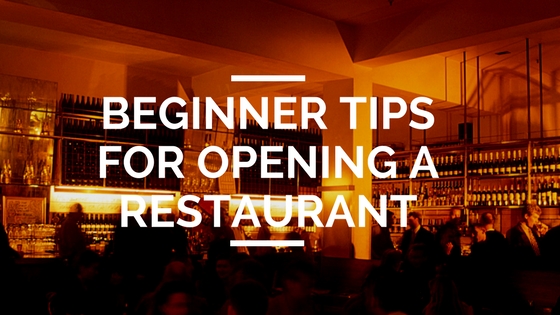
Many budding entrepreneurs think about opening up a restaurant. While there is no doubt that the restaurant business can be very lucrative, the fact is that more than 60% of new restaurants fail within the first two years. The primary reason for this high failure rate in the restaurant industry is due to lack of planning.
Here are some beginner tips to keep in mind when opening a new restaurant:
1. Have a Business Plan:
The competition in the restaurant industry is fierce and thus, the first thing you should do is develop a business plan. Consider every minute detail including the menu, the chef, floor plan, the layout and interior, seating capacity, staff selection, kitchen appliances, your working hours and how much time and money you are willing to put into the restaurant. If you think other people are going to run your restaurant for you and make you money, then the restaurant business is not for you.

2. Know Why You Want It:
Many people think of a restaurant as the quickest way to make money. This is a myth. It can take 5-10 years before you start recouping the money you invested and making profit. Running a restaurant is not a 9-5 job; it is a 7-day job with long hours. You need to be prepared for this and you need to want to be in the business. Open a restaurant if you love food, love people and are not afraid of hard work. There are no weekends off, there are no holidays and you certainly will not be going to bed early or getting up late. And more importantly, for the first 2 years you will need to invest a lot of money and time.
3. Financial Planning:
Opening a new restaurant means developing a solid plan that includes how much money you will invest and every detail of potential expenses, salaries, cost of furniture, your rental bill, utilities and lease options. You will need to look at the competitors in your area and you need to identify your target market. Finally, you will need a competitive edge and you need to know how to differentiate yourself from the competition. Only then can you expect to make money.
4. Location:
The most important factor to consider when you start a restaurant is location. Choose a good location – one that your research indicates is a thriving area for restaurants; one that has a steady flow of customers; and one that is overall considered to be a good location for people to visit. You need to see if there is people traffic during the day, night and weekends; you can only be successful if there are customers. It may also be a good idea to ensure you don’t have any direct competitors nearby. There is no point in opening a sushi place right next to a leading sushi restaurant or an Italian restaurant in the same vicinity as another favorite. You should open close to a direct competitor only if you know you have something better to offer of if there is a gap that they are unable to fulfill and which you can overcome.
5. Grease trap:
No matter how big or how small your restaurant, the one thing you will need to install is a grease trap. Without a grease trap, all the food, water and debris can block your drainage and cost you thousands of dollars in repair. Today a grease trap is a must for all restaurants. There are many variations of grease traps and the type you need may vary depending on your operations. Before you get one installed, speak to a professional.
6. Type of Restaurant:
You can’t just open any restaurant today. If there are already 3 pizza shops nearby, opening another pizza shop is destined to fail. You need to make sure that you are offering something different, a unique menu or a different style of serving food. You also need to open a restaurant with foods that are in demand and you may want to consider the new and health-conscious consumer. Most restaurants today are trying to apply these concepts – offering gluten free, low calorie meals along with their regular items, cooking in healthy oils, serving all-day breakfast etc. These decisions must be based on your market research and what your target market wants.

7. Select Staff Carefully:
One major complaint by many restaurant owners is that they can’t find reliable help. Keep in mind that restaurant staff, such as servers and hosts, are not highly paid and that is why they usually have very little loyalty. If a better offer comes along, they will move on. If you hire part-time students, be prepared that they will generally not stay long-term. Good chefs are also very hard to find and you should put some effort in finding just the right one. Plus you need to have a back-up plan if the cook falls sick. In short, you need to find people with passion and those who are not afraid to work hard.
8. Marketing Plan:
Before you open up your restaurant, create some buzz. Distribute flyers, run advertisements, promote your upcoming opening day on social media, go to the local mall and put up posters, offer food samples and so on. Survey people who fit your target profile and see what they have to say about your food. This will give you some idea what they like and do not like. Get on social media and upload images of your restaurant and your menu. You will need to create excitement so that your opening day/night sees lots of action and you need to continue your marketing activities to ensure you keep the momentum going.
Finally make sure you have at least six months of cash flow in reserve. Expect the unexpected in this business and always have a contingency plan. Keep in mind that the restaurant business is quite challenging and it may take you some time to pick up pace. But if you plan it right and offer the right items to your customers, there is no reason why your business cannot be successful.
If you're located in North Carolina and would like assistance with your grease trap we would be happy to help. Don't hesitate to give us a call today or contact us via our contact form.